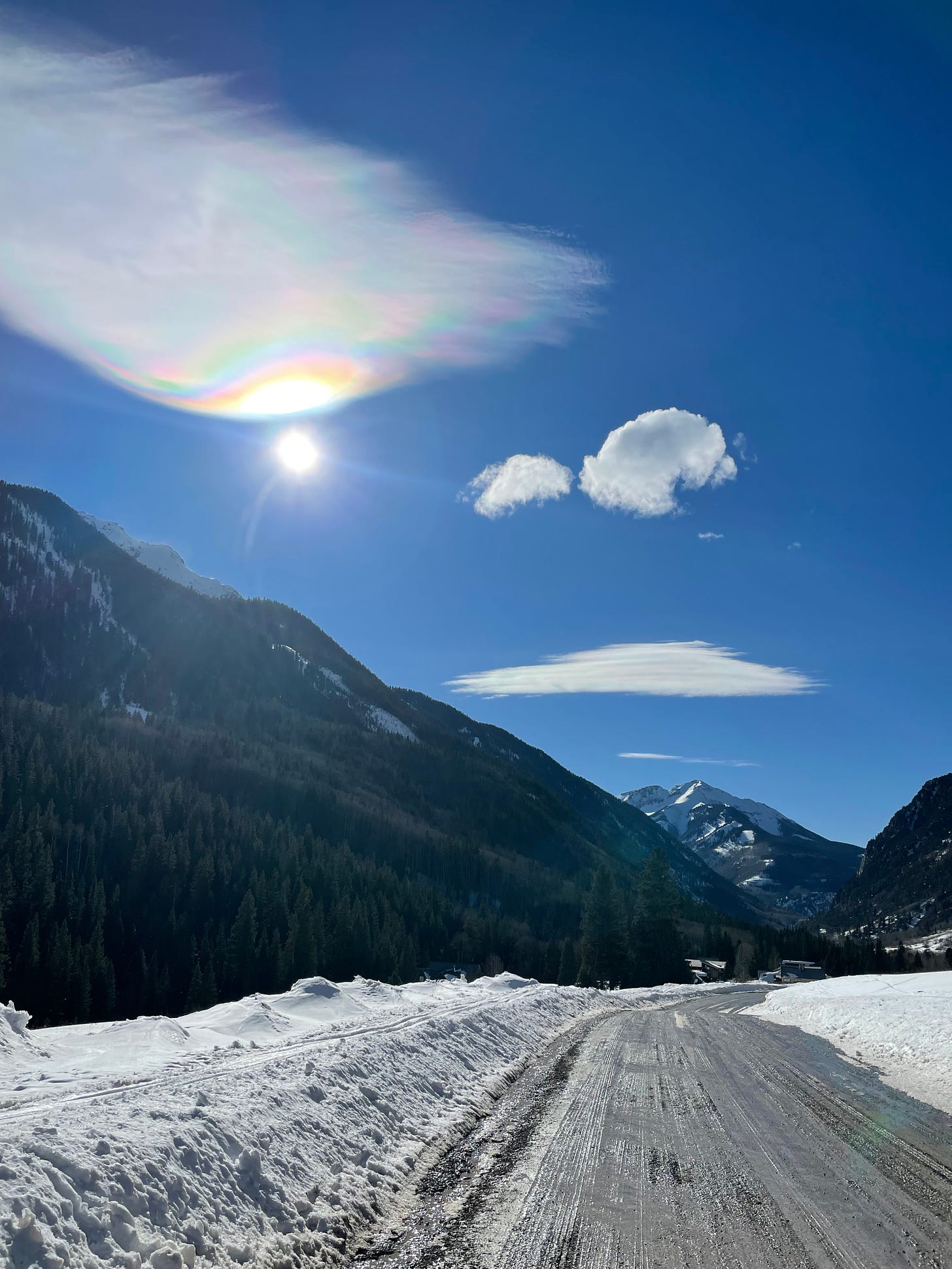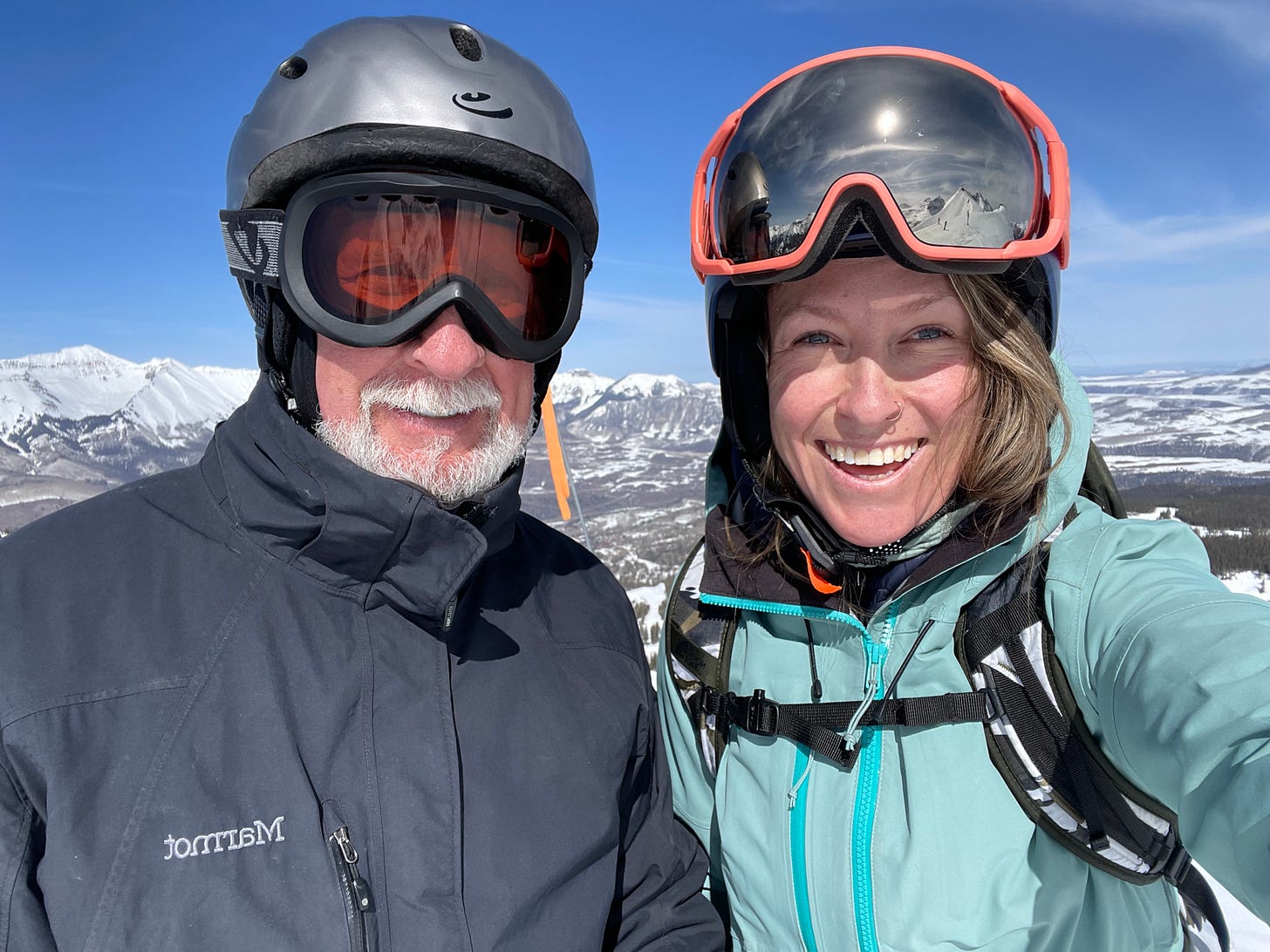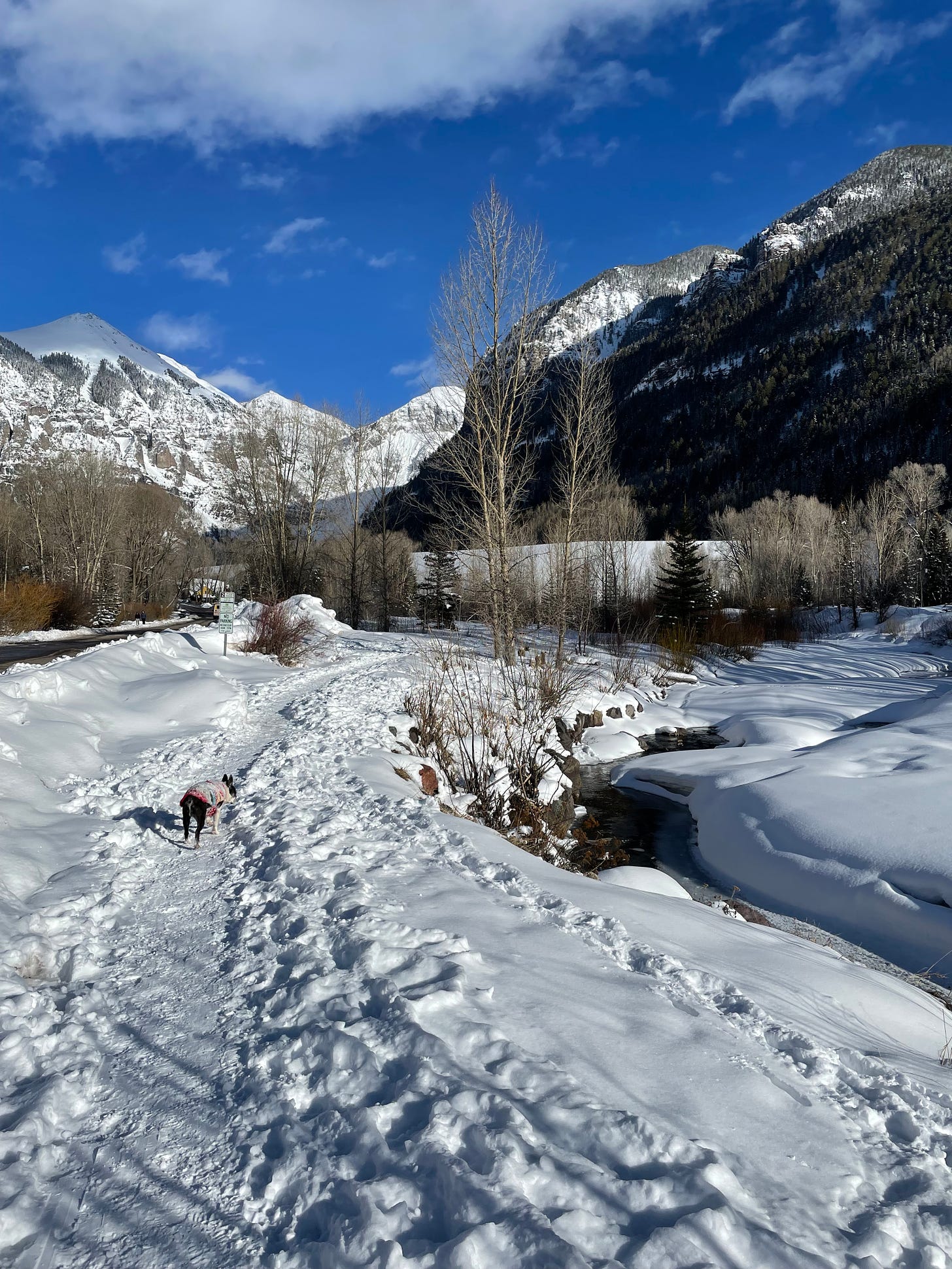“Where’s my discount?”
“Unfortunately we don’t discount the beer, just the wine.”
“What good is a locals’ discount if it’s not on beer?”
“If the discount applied to beer, we wouldn’t have any left.”
It was an out-grizzle fest. Both decked in long gray hair and beards, the battle became 22 years as a local versus 45. Beanie versus cowboy hat, flannel versus weathered denim jacket. Shop owner versus “I own this town”er. But regardless of what the older of the two thought was his right, he was buying his beer full price.
He grumbled under his breath, grabbed his beer from under the 3’x4’ germ shield and bow-legged his way out.
“What’s this I hear about a local’s discount?” I held my two bottles of wine in the air as I approached the counter, smiling.
“You tell me you’re a local, and then I give you a discount,” he smiled back at me.
“Local!” I assured him, with more jubilance than pride, more delight than accuracy.
“Discount it is. Just remind me when you come in!”
In August of last year, just a month or so after we moved in, I went to the library in town. I walked up to the counter, plexi-glassed, and asked what the process was for getting a library card. (An aside about the library: it is incredible. There is a section that is actually called “Unusual Items to Borrow” and it includes a sous vide machine, a radon detector, a metal detector, a podcast recording kit, a meat thermometer, a circular saw, a reciprocating saw, a mandolin, a violin, a child’s violin, a banjo, microscope, sewing machine, karaoke machine, lawn games, board games, and all kinds of other shit. They sell a bumper sticker that says, “Came for the skiing, stayed for the library” and many, many people have this bumper sticker.)
“Just give me your name and your PO Box,” he said from the checkout desk.
“Do you need to see an ID?” I, a woman of cities, asked.
He tilted his head a little, looking from my worn puffy to my sweat stained hat.
“Nah, you look local to me,” he squinted his eyes extra, trying to communicate the smile behind the mask.
But nearly 9 months in, we’re not locals. We just live here. Locals have been to the un-commercialized hot springs on private property that the owners make you sign a waiver to go to. Locals know the made up names of tiny neighborhoods because they were the ones who made them up. Locals know the things I don’t.
When I searched, “what makes a person a local” one of the first results was from a forum thread on Teton Gravity’s site, one of the leading production companies for ski films, highlighting just how pertinent this debate is to ski towns in particular.
Ski towns are naturally transient. It is a badge of honor to commit to a ski town as home base, to live in a place built with the preferences of tourists at the forefront and the needs of the locals only considered at the tail end of crisis. But what makes a local? Is it knowing where the tourists aren’t? Is it knowing not only the names of every run, but the backcountry ones too? Is it when the barista knows your name, or is it when you know the barista has changed yet again?
I’ve never been a local anywhere, because a real local has real loyalty. Growing up in Chesterland, Ohio, I never held loyalty, only an escape plan. My first couple years in college, I lied about where I was from. My parents had just moved back to Idaho, and so I said I was from there, trying to wash away the identity of the Midwest, not understanding what I was exchanging it for.
Even in Topanga, where I lived the longest as an adult, some seven years, I couldn’t call myself a local. I didn’t know the business owners. I didn’t participate in the local economy save for the occasional post-ride fries at Canyon Bistro or a pizza from Endless Color. What I did know were the trails, the animals, the cadence of the canyon, the winds, the way the fire would move, the back entries, the short cuts, and well, the home sales. I was local only to the bobcat, and no one else. As far as she knew, I was as old as the trees, as time. She would likely never see a human die, she would only ever see them change. And maybe that was close enough.
Here, we have a long way to local, and a rigorous approval process in the meantime. Calling yourself a local is a little like calling yourself hot — anyone who likes you will nod in approval and anyone who doesn’t will screenshot it and say, “can you believe this clown?” But it’s a sliding scale. I am not local to someone who has lived here since the 70s, but I am local to the Texans on the chairlift. So what goes into it?
Knowledge, but also, secrets
To be a local, you have to know. You know which businesses close early, you know where the best coffee is, you know things. But to truly be local, you need to know secret things, an increasingly challenging prospect given the content output of Culture Trip, Travel & Leisure, and every other large hat wearing girl trampling wild flowers in an effort to be a travel blogger. Secrets are rarer and rarer, and they’ve become their own gray area as the secrecy itself gets muddled with gatekeeping.
Rhythms
In a town like LA, it’s knowing the freeways and when to risk taking them. In the BVI, it was knowing everything would take longer than you thought. And here, the rhythms reveal themselves over time too. It doesn’t rain til the afternoon in monsoon season. The Jeeps dry up by October. Never go to the grocery when it’s school pick-up or drop-off. The free gondola parking is full by 10 on a typical day, but by you-better-get-up-early on a powder day.
A more prominent rhythm exists here though: who stays and who goes. How long do people last? Who sticks around? Who’s just checking something off their list or adding to their portfolio? Who would leave by anything other than force?
Loyalty
You have to want to protect it, preserve it, and be of it. I don’t think you have to love it, but you have to claim it, otherwise it will resist claiming you.
Time
Have you ever asked a New Yorker how long it takes to become a New Yorker? Ten years gets thrown around a lot, while softer spirits will offer benchmarks like, “when you stop looking up at buildings” or “when you walk faster than the tourists.” But time plays the largest role.
Once, in her small town in Idaho, my late Aunt Dee encountered a woman in the grocery store complaining about the speed at which the town was changing. Dee was a woman who’d known deep grief and trauma. At 70-something, she wasn’t very much phased by things like tourists and new stop lights. She laughed it off.
“Change comes for us all,” she offered to the woman, a story she recounted for us many times.
“Yeah, but this is a little much. I’ve been here for seven years. How long have you been here?”
“Forty-five years, dear. Try again.”
Immersion
I am the least sold on this one. Yes, participating in community makes you a better and bigger part of it, but if someone never votes, never hangs, never calls, but has lived somewhere for 30 years, are they not a local? It seems that with enough time, time spent simply trumps the rest of the factors. Thirty years is a long time so immersion is next on my list. To be known, and known for being a good neighbor.
Weeks ago, I talked to Cole Noble of Cole’s Climb about how to be a good neighbor in a new town. One thing I harped on is that you have to be an observer before you are a participator. You have got to learn the ropes before you can begin to wield them, and there have been moments when I felt those ropes in my hands.
Earlier this week, I went to see Heather Hansman speak about her latest book Powder Days at the aforementioned library. At the event, a woman who’d raised her family here in this town of snow said the ski bums intimidated her, including the ones she’d raised herself. She felt like she didn’t belong…in the town she’d lived and voted and participated in for decades simply because she wasn’t an extreme athlete.
That, though, speaks to why we want to be locals somewhere. We want to belong. We want to be considered to have value. We want to share that value with others, more mentor than tour guide. And we want to know we’re doing right by a place.
I felt for that mother of skiers more ferocious than her, and I thought of Ben: more fearless than me, more extreme. When I am practicing my form at the ski area, he is in the backcountry learning the winter terrain in a way I haven’t yet. I only know those spring to fall trails, he knows those backcountry runs, their couloirs and cornices. He knows where the cliffs determine his lines and where the trees twist them. I look now as I write to the east. I can just make out the lines carved on slopes accessible only by your own willpower in a valley I never name. Am I a local because I live here? Or is someone local because they know that secret bowl, know how to climb and descend it, know how to leave their mark in the backcountry snow?
I guided my dad around the ski area today. I finally had a mountain that was mine first, where I could show him instead of him showing me. We chatted up every person we shared a lift with, and I felt the urge to obscure how recently I’d moved here every time. But you can be a novice even in living somewhere, and really, you should. What matters is your shepherding and your care.
When I take Cooper to town, I walk him off leash. I can tell by the moon boots and clean cowboy hats who’s new, who’ll be gone by the weekend. I see my doctor at the grocery store, I see Snoots’s rescuer at the dog park, I see my fellow newsletter writer at the library, and I see my realtor engaged in conversation on a sidewalk corner every time I come to town, honking and waving at him for his own shepherding of me.
There’s a saying in backcountry skiing: you gotta earn your turns. But you only ever earn them if you want to. It’s the same with being of a place — you gotta earn it, but like climbing a mountain, all it takes is time, heart, and a commitment to going all in. We’re a few months shy of our first year here, only one season left to taste. And until recently, the pandemic shaped how in we could be. We had to be thoughtful of our parents visiting. We had to be cautious before catching flights. We had to be good citizens. The mask mandate here has ended, even if my own hasn’t. Everything is open and a little desperate, the last two years leaving scars of precarity. And last night, we went out to dinner for the first time indoors.
We drove not to town, but the other direction, heading south west to another town striving to bring itself back to life. There’s a restaurant there with more acclaim than any passer-through would think it has right to, with a chef who fled LA presumably for reasons not dissimilar from my own. When we walked in, the bartender said hi. Then he became our waiter. Then back to host. And then it dawned on us — we’d met him before.
Last June, when we’d driven out from Topanga to close on the house, we stopped in this town of 195 people (only 15 bigger than our own) with a reservation at the local inn. I’d been messaging with the owners, apologizing that we were running late. They were messaging me, apologizing because they wouldn’t be there at all. A friend of theirs would let us into our room. When we pulled up in front of the inn, a man appeared from the bar across the street and jogged toward us. He’d been having a beer with the daughter of the man we were buying our house from. And he was our waiter last night.
That’s a good neighbor.
As the days lengthen and temperatures in the 40s make themselves regulars, I look to the spring and summer and I think of how to court them, how to convince them I am here to stay, to bloom, to root. But the landscape is often happy to accept another body to nourish its soul — it’s the people I need to work on. I am looking up classes at the art school, volunteer events at the radio, and making lists of trails and peaks to climb. What I give determines what this town will give back, and in time — in loyalty and commitment — maybe I’ll even have a few secrets of my own.









Memphis is my home base location and I know it like the back of my hand, therefore I'm local in general. Specifically knowing instinctively how to get somewhere without thinking, knowing why someone won't look you in the eye for varied reasons, knowing that music is the life blood and common denominator in a place where racial strife still exists, knowing that 'bless your heart' isn't a concern for another's well being but a subtle statement of disagreement, knowing the heartbeat of the Bluff city is the Mighty Mississippi that flows below. These are learned over time by intuition, observation, and experience. Individuals become part of the whole in the ways listed and expressed in your story, but at their own pace irregardless of duration of stay or approval of others.
We're traveling, with no plans of achieving the hallowed "local" badge anytime soon, but i believe a local is someone the other residents of a town can recognize as someone who is reliable, who makes a good member of the community. Some need a little longer, some don't. The important thing is to try, even if you're just "passing by" like us, or like The Crusher in the Bugs Bunny cartoon...(https://www.youtube.com/watch?v=o842Aco7kj8 – at about 3:01 8^))